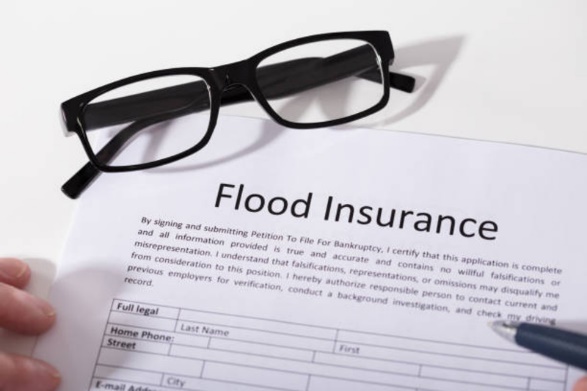Navigating Disaster: A Guide to Assistance Without Flood Insurance
Feb 03, 2024 By Susan Kelly
Experiencing a disaster, such as a flood, often leaves in its wake a trail of destruction and despair. This ordeal can be even more challenging for those without flood insurance, adding financial stress to the already devastating situation. This guide aims to provide a lifeline to those who find themselves in this predicament. We'll explore a range of resources, strategies, and options available to you, helping you navigate this challenging time and set a course towards recovery. Remember, all is not lost. Even without flood insurance, there are still ways to rebuild, recover, and restore your life and property.
What is Flood Insurance?

Flood insurance is a type of insurance that covers damage to your property caused by flooding. This includes damage to your home, personal belongings, and other structures on your property. It is typically purchased as an add-on to your homeowner's insurance policy or through the National Flood Insurance Program (NFIP).
Why Didn't I Have Flood Insurance?
There are a few reasons why someone may not have flood insurance. One common reason is that they live in an area that is not considered high-risk for flooding, so they don't think it's necessary. Another reason may be that they couldn't afford the additional cost of flood insurance on top of their homeowner's insurance. In some cases, homeowners may also mistakenly believe that their homeowner's insurance covers flood damage, when in fact it typically does not.
What Are My Options Without Flood Insurance?
If you don't have flood insurance and your property has been damaged by a flood, there are still resources available to help you recover. Here are some options to consider:
Federal Disaster Assistance
After a declared disaster, the Federal Emergency Management Agency (FEMA) may offer financial assistance to individuals and families affected by the disaster. This can include grants for temporary housing, home repairs, and other needs not covered by insurance. However, this assistance is typically only available if the disaster has been declared a federal disaster.
Small Business Administration Loans
The Small Business Administration (SBA) also offers low-interest disaster loans to homeowners, renters, and businesses of all sizes. This can help with the costs of repairing or replacing damaged property not covered by insurance.
Community Resources
Don't overlook the power of community support in times of crisis. Local organizations, churches, and charities may provide assistance with immediate needs such as shelter, food, and clothing. They may also offer resources for long-term recovery efforts, such as assistance with repairs or rebuilding.
Personal Savings or Loans
If you have personal savings, that can be a valuable resource in times of crisis. It can help cover immediate needs and expenses while you work on recovering and rebuilding your property. If you don't have savings, consider applying for a loan to cover the costs of repairs or rebuilding. This could include traditional bank loans, credit union loans, or even crowdfunding.
Steps to Take After a Flood Without Insurance
If you find yourself without flood insurance after experiencing a flood, here are some steps you can take to start the recovery process:
Document the Damage
Take photos and videos of all damage to your property and belongings. This will help when filing insurance claims or seeking financial assistance.
Contact Your Local Government
Your local government may have resources available to assist with immediate needs, such as shelter or food assistance. They can also provide information on any declared disasters and how to apply for federal disaster assistance.
Determine Eligibility for Federal Assistance
If a disaster has been declared, you can apply for federal disaster assistance through FEMA. They will consider your eligibility based on the extent of your damages and other factors.
Apply for SBA Loans
If you are eligible, consider applying for a low-interest disaster loan from the SBA to cover costs not covered by insurance.
Seek Community Support
Reach out to local organizations and charities for assistance with immediate needs and long-term recovery efforts.
Rebuild and Recover
It may take time, but with patience and determination, you can rebuild and recover from the damage caused by the flood. Consider seeking professional help for repairs or rebuilding if needed.
Preparation and Prevention

While it may be too late for preparing or preventing flood damage in your current situation, it's never too early to start thinking about the future. Here are some steps you can take to prepare and prevent potential flood damage:
Purchase Flood Insurance: If you live in an area prone to flooding, it's always a good idea to purchase flood insurance. Don't wait until it's too late.
Know Your Risk: Educate yourself on the potential risks in your area, such as flood zones and evacuation routes. This will help you prepare for potential disasters and know what to do in case of an emergency.
Create a Disaster Plan: Having a plan in place can significantly reduce the stress and chaos during a disaster. Make sure all family members are aware of the plan and know what to do in case of a flood.
Protect Important Documents: Keep important documents such as insurance policies, identification, and financial records in a safe and waterproof location. This will make it easier to file claims or apply for assistance if needed.
Maintain Your Property: Regularly maintain your property by cleaning gutters, fixing leaks, and elevating critical utilities such as electrical panels and HVAC systems. This can help prevent damage in case of a flood.
Conclusion
Floods can happen at any time, and it's essential to be prepared for them. Whether you have flood insurance or not, there are resources available to help you recover from the damages caused by a flood. However, the best course of action is to be proactive and take steps to prevent or minimize potential damage from floods in the future. Hopefully, this guide has provided valuable information on what to do if you don't have flood insurance and how to prepare for potential flooding events.

How to Choose the Best Mutual Funds at Charles Schwab
Oct 02, 2023
In the 30 years they have been in business, Charles Schwab has provided investors with various low-cost mutual fund alternatives. Schwab's "product approach is to suit the investor's shifting demands," says D.J. Tierney, senior portfolio strategist. We have a simple offering of core investor goods and solutions that will be competitively priced..

Best Place to Buy Used Furniture Estate Sales
Feb 25, 2024
Looking for used furniture on a budget? Learn why estate sales are one of the best options and gain access to tips that will make it an easy shopping experience.

What Are Load-Waived Funds?
Dec 04, 2023
Load funds are a type of mutual fund that is able to charge the cost of buying the shares or selling them. It is calculated as a percentage of the amount an investor buys or sells. The buyer pays the cost of the load and uses it to compensate a broker or an investment adviser for their time and expertise in choosing the appropriate fund.

Ways to Buy a House That Is Easy to Rent
Jan 30, 2024
An investment in real estate needs to be safeguarded. In addition to standard homeowner's insurance, landlords can also purchase insurance to protect themselves financially in the event that a tenant or visitor is injured on the property

What Should be your Financial To-Dos in your 20s?
Nov 08, 2023
It's important to make wise financial choices in your twenties since they can affect your life for decades. Incorporate these suggestions into your current routine to ensure your long-term effectiveness.

Navigating Retirement with a 401(k)
May 18, 2024
Recognize the fundamentals of 401(k) retirement savings, including employer matches and investment options.

Innovative Gifts for College Funding
Dec 13, 2023
If your loved one is feeling down, include puzzles, crossword puzzle books, adult colouring books with markers, board games, word searches, and other activities in a care box.

Avoid Capital Gains Tax on Your Asset Property
Nov 20, 2023
Match defeats Investors can take losses to balance out and offset their gains for a given year. Savvy investors collect capital losses as they happen and use them to reduce their present and future tax obligations. Extra losses that aren't applied to gains can be used to offset ordinary income up to $3,000 in total.

Understanding Home Appraisals
Jan 13, 2024
Have you ever wondered why home appraisals are so important? Read on to find out how home appraisals can affect your ability to purchase a new property and get tips for getting the most out of yours.

How Excess of Loss Reinsurance Operates in the Insurance Industry?
May 08, 2024
Explore the crucial role of Excess of Loss Reinsurance in managing catastrophic risks, its benefits, claims process, and future trends in the insurance industry.

When Is The Best Time To Invest
Oct 14, 2023
Want to maximize your profits and minimize risk when investing? Here's a comprehensive guide to determining the best time to invest in stocks, bonds, and mutual funds.

Complete Guide: How To Report and Pay Independent Contractor Taxes?
Dec 05, 2023
When making their tax payments, employees have a reasonably easy time. Taxes are deducted by their employer from each paycheck, and the proceeds are remitted to the appropriate governmental authority. Employees have to pay taxes on their income as earned, and they typically expect to receive a return when it comes time to file their taxes. Paying taxes is not as straightforward for independent contractors as it is for employees of corporations.